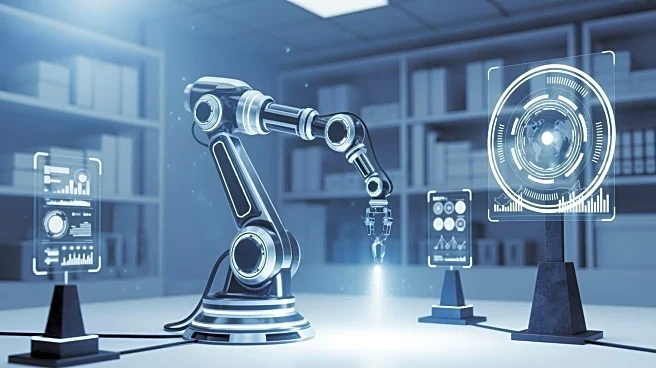What's Happening?
Honeywell has announced two new AI-driven solutions aimed at improving efficiency and performance for frontline workers in retail and logistics sectors. The innovations include enhanced capabilities for Honeywell's AI assistant designed for mobile computing
platforms and the introduction of the CT70 handheld computer. These tools are intended to optimize tasks such as inventory tracking and returns management. David Barker, President of Honeywell Productivity Solutions and Services, emphasized that these solutions are developed with workers at the center, combining next-generation mobile computing with machine vision and agentic AI to boost productivity across various industries.
Why It's Important?
The introduction of Honeywell's AI innovations is significant as it addresses the growing need for efficiency in industries like retail and logistics, which are critical to the U.S. economy. By enhancing inventory management and customer service capabilities, these tools can potentially reduce operational costs and improve service delivery. The CT70 mobile computer, with its real-time data access and advanced connectivity features, empowers workers to perform tasks more effectively, which could lead to increased productivity and reduced errors. This development is likely to benefit businesses by providing them with more reliable data and connectivity, thereby enhancing their competitive edge.
What's Next?
Honeywell plans to integrate RAIN RFID technology into the CT70 mobile computer by early 2026, which will further enhance inventory accuracy and data management capabilities. As these innovations are adopted, businesses in retail and logistics may experience improved operational efficiency and customer satisfaction. Stakeholders, including industry leaders and technology partners, are expected to monitor the impact of these tools on workforce performance and explore additional AI applications to further streamline operations.
Beyond the Headlines
The deployment of AI in workforce management raises ethical considerations regarding job displacement and data privacy. As AI tools become more prevalent, companies must address potential concerns about the impact on employment and ensure that data collected through these technologies is handled responsibly. Additionally, the long-term shift towards AI-driven solutions may necessitate workforce retraining and adaptation to new technologies.
















